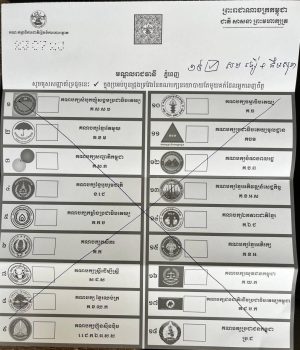In the wake of Prime Minister Hun Sen’s overwhelming victory at Sunday’s national election, Cambodian police are investigating several dozen opposition activists who destroyed their ballots to protest the exclusion of the Candlelight Party.
According to a report by Radio Free Asia, which cited Cambodian officials, police are targeting 44 people who allegedly incited people to submit spoiled ballots on the orders of what officials are now dubbing, with party-line consistency, “extremist groups abroad.”
This is code for the political movement loosely associated with the exiled opposition leader Sam Rainsy, who prior to election day called on voters to submit invalid or spoiled votes to protest an election in which the CPP faced little to no real opposition. According to preliminary results, the CPP won 120 of the 125 seats in the National Assembly, with the remainder going to the royalist Funcinpec party.
The CPP’s near-total dominance was assured in May, when the Candlelight Party, the latest avatar of the opposition party formed by Rainsy in 1998, was barred from participating over “irregularities” with its application.
“Cambodians, no matter which party they support, are being cheated of their right to cast their vote in a free and fair contest,” Rainsy told CNN prior to the election. “Spoiled ballots will underline the aspiration of ordinary Cambodians to take part in real elections.”
As polling stations opened on Sunday, Rainsy posted dozens of photos, allegedly taken by voters, of ballots with a large X drawn across them, on his Facebook page. Some have other messages written on them, including “write-in” votes for Rainsy and Kem Sokha, his former colleague in the banned Cambodia National Rescue Party.
Among those arrested in recent days were three officials from the Candlelight Party, including Chao Veasna, the party’s vice president in Banteay Meanchey province in the country’s west. Veasna was detained yesterday after he posted a photo of his spoiled ballot on social media. The 44 officials have been identified by name and image in government-aligned media.
The National Election Committee (NEC) reported yesterday that spoiled ballots comprised 5.37 percent of the total votes cast on Sunday. NEC spokesperson Hang Puthea said that the spoiled ballots were the responsibility of “extremist groups abroad” who wanted to “destroy the election process.” Hun Sen has used the same phrase to refer to exiled opposition figures.
According to the public database Kamnotra, one of several websites that the Cambodian government ordered blocked prior to the July 23 election, the capital Phnom Penh had the highest rate of spoiled ballots, with 7.5 percent, followed by the surrounding province of Kandal (6.9 percent). Both provinces have historically seen stronger support for opposition parties.
Assuming that the NEC’s figures can be trusted, the rate of spoiled ballots was significantly lower than in 2018, when the NEC reported that a remarkable 8.55 percent of votes were invalid or blank. Rainsy and his allies also called for a boycott of that election. The rate at the two elections prior to that, in 2013 and 2008, did not exceed 1.6 percent.
These investigations reflect the government’s harsh and paranoid reaction to the opposition’s call on voters to spoil ballots. This response partly stems from a generalized dissent of any kind, however mute and innocuous, and fears that a high rate of protest votes could burnish the CPP’s “victory,” which will act as a prelude to the long-planned handover of power from Hun Sen to his eldest son Hun Manet.
The passing of the baton from father to son will also be accompanied by a generational transition within the CPP, which will reportedly see most of the party’s cabinet ministers, some of whom have served in their positions for more than two decades, step aside in favor of officials in their 40s and 50s. (In some posts, including the ministers of defense and interior, the current occupants will be succeeded directly by their sons.)
In a voice message released on Telegram on Sunday, Hun Sen demanded that opposition activists who posted photos of spoiled ballots publicly apologize, Camboja reported. “You can come out and confess with the authorities, with the NEC, especially with the authorities, because the movement to spoil the ballot is a crime that must be punished,” he said via Telegram voice message. “Please turn yourself in and confess to the authorities at the nearest place, otherwise legal action will be taken.

































